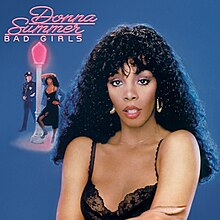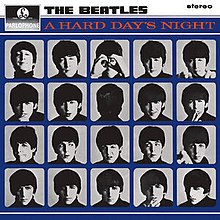Caffé Latté presents the all-time
200
MOST ESSENTIAL
ALBUMS
70 ARRIVAL Abba
69 IT TAKES A NATION OF MILLIONS TO HOLD US
BACK Public Enemy
68 COSMO’S FACTORY Creedence Clearwater Revival
67 SURREALISTIC PILLOW Jefferson Airplane
66 HOTEL CALIFORNIA Eagles
o
o o
65
BAD GIRLS
DONNA SUMMER
1979

Donna Summer had already been releasing albums that heavily influenced trends in dance music before 1979. With Giorgio Moroder and Pete Bellotte at the helm as co-writers and producers, the trio were never confined to just disco. They had created a revolution with tracks such as "I Feel Love" on 'I Remember Yesterday', prophetically previewing the future of dance.
By the release of 'Bad Girls', the decade of disco was nearing its end. The genre had been a behemoth in recent years, but was reaching saturation point. Summer's team saw the writing on the wall and planned a double album that would see the singer explore a variety of styles.
"Hot Stuff" opens the album, mixing disco with a heavy dose of rock and a hint of new wave. The fusion was radical for the time. That US #1 hit was followed seamlessly by the title track, another chart-topper. "Love Will Always Find You" and "Walk Away" added new flavours to disco.
Flipping the first disc, Summer serves soaring vocals over a dance beat on "Dim All The Lights". There's a rock/ funk edge on the disco track "Journey To The Center Of Your Heart". More disco is in store with "One Night In A Lifetime" and "Can't Get To Sleep At Night".
The 2nd disc shifts mood, beginning with the country-tinged ballad "On My Honor". Next, Summer infuses "There Will Always Be A You" with a soulful reading. Country and R&B come together on "All Through The Night". The tender love song "My Baby Understands" completes this side. More than on any other side, here Summer lays the foundation of the musical directions she would pursue in the 1980s.
A climactic end awaits on the final side. Moroder maps out the destiny of dance music with avant garde sounds way ahead of their time. The last tracks begin with the orgasmic blast of "Our Love", followed by the cutting edge "Lucky". Moroder is assisted by Pete Bellotte, Keith Forsey and Harold Faltermeyer for the closing track "Sunset People".
With 'Bad Girls', Summer not only proved that disco could produce artists of substance, but it proved that she was not confined to the genre. She positioned herself just as disco was losing momentum with evidence of her versatility. The album also directed dance music into future sub-genres. Few artists do what Summer accomplished on this album. Subsequent acts such as Madonna, The Pointer Sisters and Whitney Houston benefited from the blueprint dropped by Summer.
O
64
LIVE AT THE APOLLO
JAMES BROWN
1963

Harlem's Apollo Theatre was a legendary venue any R&B act had to play as a badge of honour. Its stage was immortalized on October 24, 1962 when James Brown was captured live.
The funk wizard's records had already revolutionized R&B. In a live context, Brown was even more incendiary. No one could match his boundless energy. The frenzied reactions from the audience remains a testament to the supreme showman's power to command a stage.
O
63
INNERVISIONS
STEVIE WONDER
1973

Stevie Wonder continued his growth as a musician and social commentator on 'Innervisions'. Themes such as drug use, racism, spirituality and political disenchantment act as the album's pivots.
Motown's resident genius serves us new highlights from his golden period. "Living For The City" describes the struggles of everyday African-Americans. Wonder gets romantic on "Golden Lady". The perils of drugs is broached on "Too High". The mood is tender for "All In Love Is Fair". Funk comes to the fore on "Higher Ground".
Wonder reflects the state of affairs on "Visions", "He's Misstra Know-It-All" and "Jesus Children Of America". He offers optimism on the cheerful "Don't You Worry 'Bout A Thing".
O
62
A HARD DAY'S NIGHT
THE BEATLES
1964

The Beatles' 3rd studio album was the first to consist of nothing but originals, all 13 written by John Lennon and/ or Paul McCartney. George Martin produced the sessions for 'A Hard Day's Night'.
Beatlemania was in full swing by the time this LP was unleashed to an eager public. The Fab Four were busy touring while they created this body of work. A similarly-titled film starring the group included some of the album's tracks.
The LP features the global #1 singles "Can't Buy Me Love" and the title track. These standouts are as strong as other songs such as "Things We Said Today", "I Should Have Known Better", "You Can't Do That", "I'll Be Back", "And I Love Her", "If I Fell", "I'll Cry Instead" and "Any Time At All".
The consistent quality of these songs justifiably further endeared the group to critics and fans alike. Lennon and McCartney had developed their writing. As a band, the 4 members were reaping the fruits of years spent performing live.
O
61
THE UNFORGETTABLE FIRE
U2
1984

With the release of 'The Unforgettable Fire', U2 explored a new sonicscape. Steered by producers Brian Eno and Daniel Lanois, the Irish band avoided repeated itself. The new album was a marked departure from the rock sound of its previous studio effort, 1983's 'War'.
Powered by The Edge's distinctive guitar-playing, U2 and the production duo created a new direction. Its sound would become a defining style of the mid-1980s, influencing acts such as the Cure, Peter Gabriel, The Smiths, Echo & The Bunnymen and Simple Minds.
The album's finest moments include "Pride (In The Name Of Love)", "Bad", "A Sort Of Homecoming" and the title track. 'The Unforgettable Fire' secured U2 a place among the greatest groups in rock history.
O
No comments:
Post a Comment